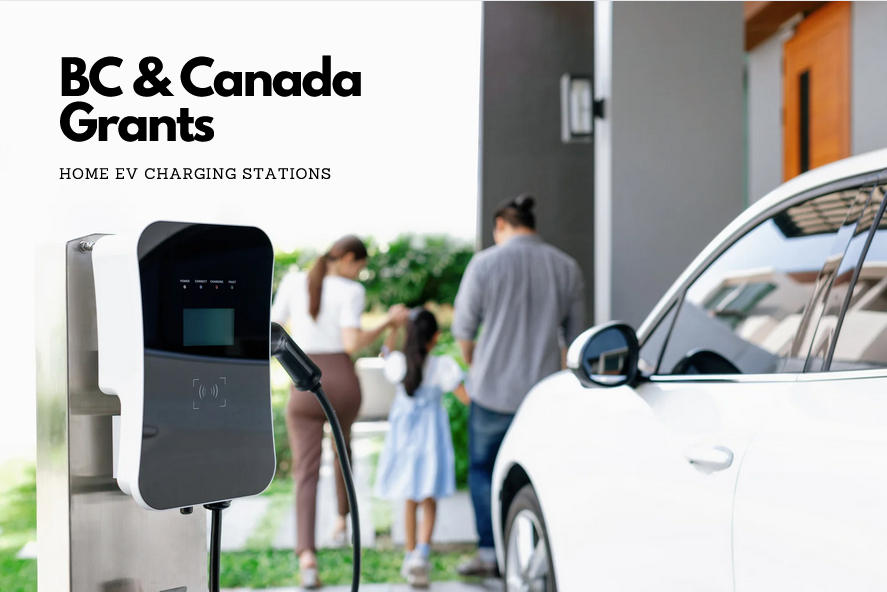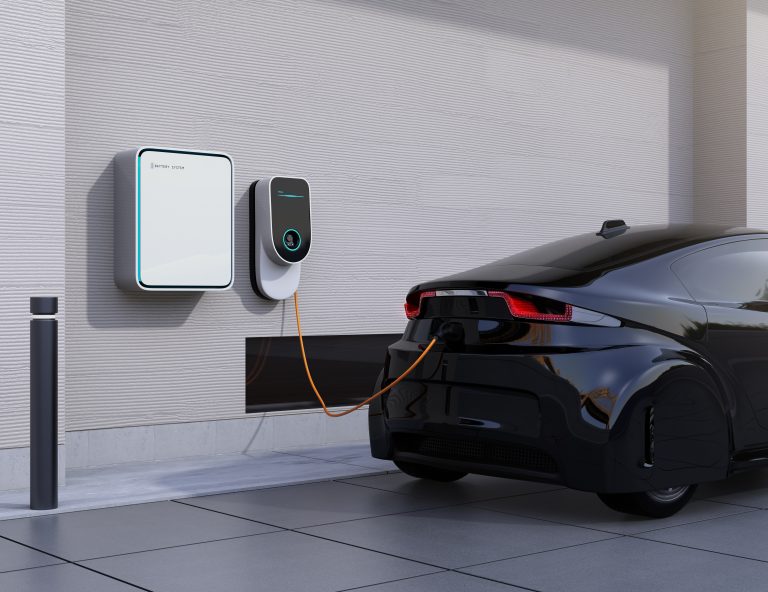EV Charging Station Installation Guide
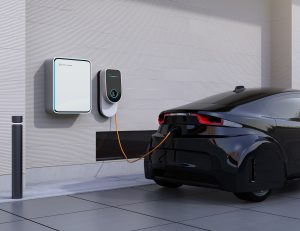 We hope this EV charging station installation guide will answer many of your questions you may have about installing an EV home charging station. With the rise of electric vehicles (EVs), many Canadian homeowners are considering installing one.
We hope this EV charging station installation guide will answer many of your questions you may have about installing an EV home charging station. With the rise of electric vehicles (EVs), many Canadian homeowners are considering installing one.
In this EV charging station installation guide, we’ll delve into the installation requirements and process. We’ll also explore what it takes to bring this futuristic convenience to your home.
Then, we’ll discuss the essentials, the process, potential costs, and how it might impact your monthly electricity bill. So, buckle up, because the journey to a greener future begins right at your doorstep!
Understanding EV Charging Stations
Before we dive into the nitty-gritty details of installation, let’s understand the three primary types of EV charging stations available. These include Level 1 (L1), Level 2 (L2) and Level 3 (L3) charging stations.
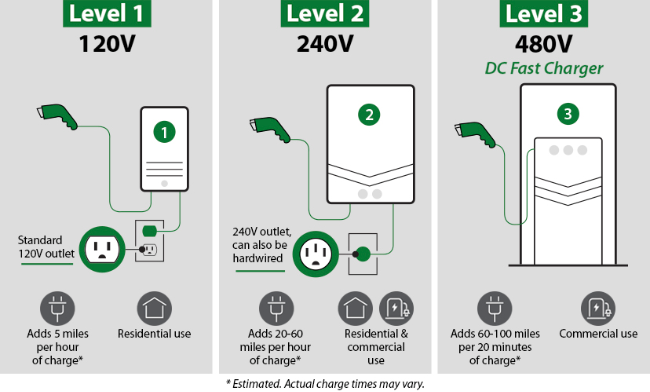
Level 1 EV Charging Stations (L1)
Voltage: 120 volts
Power Output: Ranges from 1.4 kW to 1.9 kW
Typical Use: Residential settings
Charging Time: Approximately 20+hrs
Connector Type: SAE J1772 or Type 2
Level 2 EV Charging Stations (L2)
Voltage: 208-240 volts
Power Output: Ranges from 3.3 kW to 19.2 kW
Typical Use: Residential settings
Charging Time: Approximately 4-8 hours
Connector Type: SAE J1772 or Type 2
Level 3 EV Charging Stations (L3 Fast Chargers)
Voltage: 480-600 volts
Power Output: Typically, above 50-350 kW
Typical Use: Public charging stations
Charging Time: 30 minutes to 1 hour
Connector Type: CHAdeMO, CCS, or Tesla Supercharger
For EV charging station installation at home, the focus is primarily on Level 2 charging stations. They provide a good balance between charging speed and affordability. The charge time is dictated by the model of vehicle and battery size not just the charge rate.
You can find more information on this topic in this BC Hydro article, Choosing a Home EV Charger.
The EV Charging Station Installation Process
Now that you’re familiar with the types of EV charging stations, let’s walk through the installation process, step by step including:
- Assessment & Planning
- Possible Electrical Upgrades
- Charging Station Installation
- Permits & Inspections
- Approximate Installation Costs
Assessment and Planning
Site Visit – Our electrician would conduct a thorough site visit to evaluate your electrical system. We would determine the optimal location for the charging station and assess if you would require any electrical upgrades.
Electrical Panel Check – The existing electrical panel’s capacity will be reviewed to ensure it can accommodate the additional load.
Electrical Upgrades (If necessary)
Electrical Panel/Service Upgrade – If the existing electrical panel and service is not equipped to handle the additional load, an electrical panel upgrade may be necessary. This involves installing a larger electrical panel and potentially upgrading the service entrance cable.
Wiring Installation – New electrical wiring may be required to connect the charging station to the electrical panel. The electrician will ensure that the wiring complies with your local electrical codes.
EV Charging Station Installation
Mounting the Charging Station – Our electrician would mount the charging station in the agreed-upon location. The installation would ensure it meets safety standards and is easily accessible by you, the homeowner.
Connection Setup – We would then connect the EV charging station installation to the power supply, ensuring a secure and code-compliant installation.
Testing – A thorough testing process would be conducted to ensure the EV home charging station is functioning correctly and safely.
Permitting & Inspection
Permit Application – In all jurisdictions, a permit is required for the charging station installation. As your electrician, we would handle the necessary paperwork and submit the permit application on your behalf.
Final Inspection – Once the home charging station installation is complete, a local inspector would assess the electrical work to ensure it meets electrical code requirements.
Approximate Installation Costs – Breaking Down the Numbers
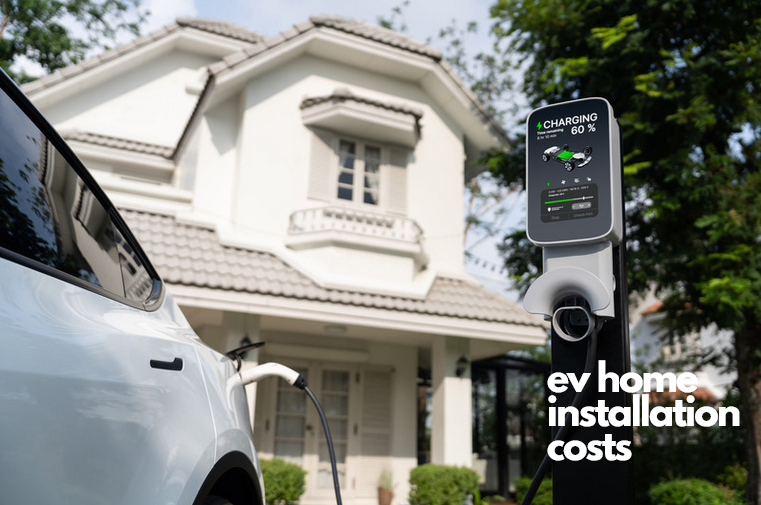
Here’s a breakdown of potential EV home charging station installation costs:
Charging Station Cost
Level 1 Charging Station – This charger typically comes with most electric vehicles and would plug into a dedicated 120V outlet at the desired location. Price can vary from $500-$1500.
Level 2 Charging Station – Costs for a Level 2 charging station can vary from $700 to $2,500. The price will be influenced by the brand of EV/charger as well as your desired charging rate.
Electrical Upgrades
Panel Upgrade – If an electrical panel upgrade is required for the EV charging station installation, it can cost anywhere from $1,000 to $3,000 or more. It would depend on the size of the electrical panel and the complexity of the upgrade.
Wiring Installation – The cost of installing new wiring for the EV station can vary between $500 and $1,500. This would depend on the distance between the electrical panel and the charging station.
Installation Labour
Labour Costs – The total labour cost will depend on the complexity of the installation and how long it takes to do the install. This would be assessed on site and will be included in our quotation.
Permit Fees
Permit Fees – Permit fees will vary by location but can range from $50 to $500. The permit value is based on the total project cost.
Total Estimated Cost
Level 2 Charging Station Installation: Considering all the factors, the total cost for installing a Level 2 charging station can range from $1,500 to $7,000 or more.
It’s important to note that these are rough estimates, and actual costs may vary based on specific circumstances and other mitigating factors.
EV Charging Station Impact on Monthly Electricity Bill
One of the top concerns for many homeowners when considering an EV charging station installation is the potential impact on their monthly electricity bill.
Let’s break down the factors that may influence this impact:
Charging Station Efficiency
Energy Consumption – The efficiency of the charging station and the charging process itself will impact the amount of electricity consumed. Newer, modern EV charging station installations tend to be more energy efficient.
Charging Habits
Charging Frequency – How often you charge your electric vehicle will obviously affect your electricity consumption. Daily charging will lead to higher monthly bills compared to occasional charging.
EV Battery Size
Battery Capacity: The size of your EV’s battery determines how much energy it can store. Larger batteries will require more electricity for a full charge.
Energy Source
Green Energy Options – Opting for a renewable energy plan or using solar panels to generate electricity can mitigate the environmental impact and, in some cases, help reduce overall electricity costs.
BC & Canada Grants to Install EV Charging Stations

There are various grants and incentives available in British Columbia and Canada to support your EV charging station installation at home.
However, the availability and details of these programs can change. It’s essential that you check for the latest information from official sources or relevant government websites.
Below is a general summary based on information available at this time.
British Columbia EV Rebates
CEVforBC – Clean Energy Vehicle Program
The CEVforBC program offers incentives for purchasing qualifying electric vehicles. It also provides support for the installation of EV home charging stations. Rebates are available for the purchase and installation of Level 2 (240-volt) EV home charging stations.
BC Hydro – EV Charger Rebate
BC Hydro provided rebates are available to residential customers who install Level 2 charging stations at home. The BC Hydro rebate program aims to encourage the adoption of electric vehicles and support the expansion of home charging infrastructure.
In Canada:
iZEV – Incentives for Zero-Emission Vehicles
The iZEV program was a federal initiative that provided incentives for purchasing zero-emission vehicles, including electric vehicles. While the program primarily focused on vehicle purchase incentives, it indirectly supported EV home charging station installations by promoting the adoption of electric vehicles.
Home & Work Charging Infrastructure Incentive Program
The federal government announced plans to introduce an incentive program to support the installation of electric vehicle charging infrastructure at home and in workplaces. This program aims to accelerate the deployment of EV charging stations and enhance accessibility for Canadians.
Check for Grant Updates
Since information can change at any time, it’s crucial to verify the current status of these rebate programs. Also, stay open to exploring new initiatives that may have been introduced recently.
Visit official government websites like the BC government, Natural Resources Canada, and local utility providers like BC Hydro and FortisBC. There you can find the most accurate and up-to-date rebate information for EV charging station installation at home.
Keep in mind that rebate programs may have specific eligibility criteria, application processes, and funding limits. It is advisable to thoroughly review the guidelines provided before undertaking an EV home charging station installation.
Driving Toward a Sustainable Future
The winds of change are blowing through Canada’s neighbourhoods, and they’re electric.
As the electric vehicle revolution gains momentum, installing an EV home charging station becomes a practical and environmentally conscious choice.
While there are upfront costs and considerations, the long-term benefits extend beyond personal convenience. You are not only contributing to a greener future, but you also gain independence from public EV charging stations.
Contact Premium Electric
Thanks for reading our EV charging station installation guide.
Our fully bonded and certified electricians can ensure a smooth EV home charging station installation. We will guide you through the assessment, recommend necessary upgrades, and ensure that your EV charging station is safely integrated into your home’s electrical system.
Whether you’re charging up for a cross-country adventure or simply powering your daily commute, let the journey start right in your garage. Get ready to plug in and drive toward a cleaner, greener tomorrow.
Premium Electric is locally owned and services clients 24/7 in Abbotsford, Mission, and Chilliwack. We also service most local communities throughout the Fraser Valley and the Vancouver Lower Mainland.
Our locally owned electrical company offers both residential electrical and commercial electrical services. Ask us about electrical repairs, inspections, electrical installations, or emergency electrical services.
Please call us call us at 604-308-6195 or send us an email if you still have questions about EV charging station installation.


